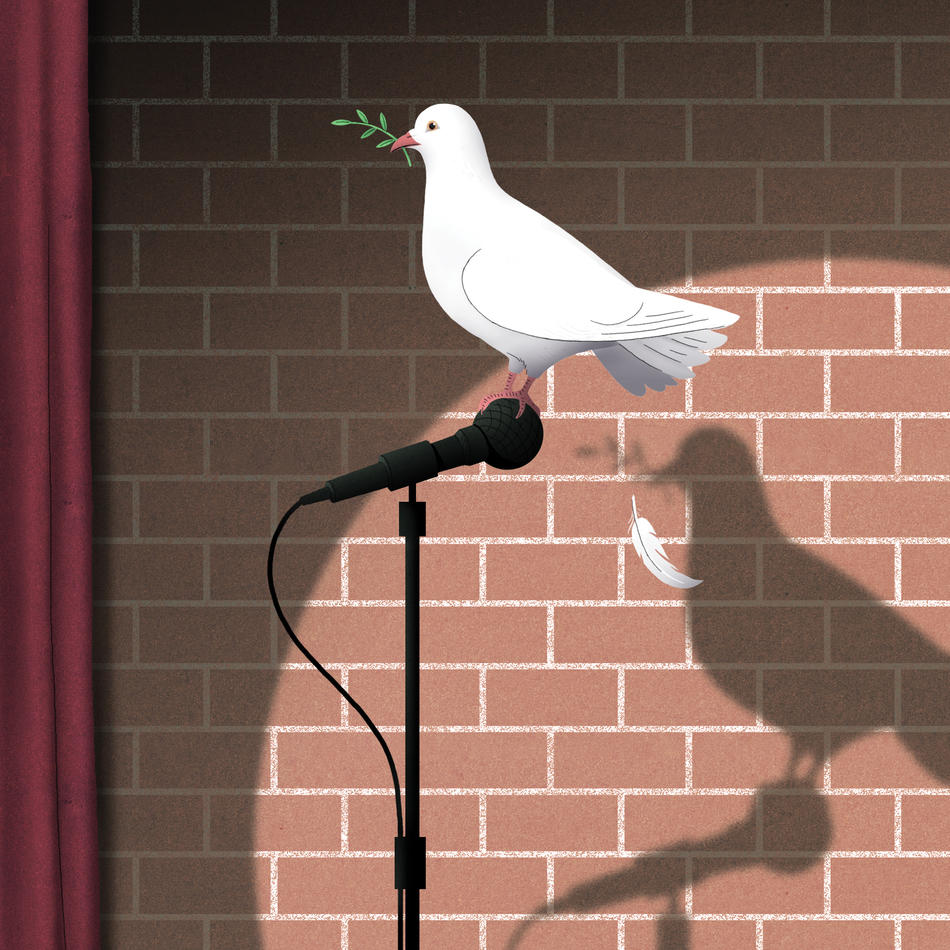So, a Muslim American comedian, an Asian-American comedian, and a Jewish American academic walk into a room ...
Well, almost. Azhar Usman of Chicago and Jenny Yang of Los Angeles didn’t walk into the room; they were projected onto a screen via Skype at the Kellogg Center in the International Affairs Building. There they joined educator Nancy Goldman ’11TC and moderator Wajahat Ali to discuss the role of humor in social justice, as part of Columbia’s annual Sustaining Peace Forum, an all-day event cosponsored by centers at the Earth Institute, SIPA, Teachers College, and the business school.
Ali, a writer and lawyer, opened with a crack about Usman’s tardiness (“This is Muslim Standard Time; stereotypes are being perpetuated as we speak”) before offering a dictionary definition of peace: “the freedom from disturbance; tranquility.” Yet, he said, “the role of comedians is often to disturb, disrupt, be loud, agitate, and upset.” Yang told the crowd that there “needs to be disruption and sometimes some unrest for peace to happen,” and that challenging power through humor “makes us feel like we’re less crazy. Someone has to say ‘the emperor has no clothes’ or else we’ll go insane.”
Usman traced comedy’s protest roots to the 1950s, when comics from minority backgrounds began confronting societal hypocrisies. “The great pioneers — Lenny Bruce, Dick Gregory — were basically a crew of Black American and Jewish American standup comedians,” Usman said. “They were always agitating, always making audiences uncomfortable.” They were also getting laughs — in effect, softening up a listener’s defenses, allowing their ideas to seep through.
“Jokes create an opening,” said Goldman, an adjunct assistant professor at Teachers College. “You’re more open physically and cognitively when you hear a joke.” Yang spoke of using humor “as a direct line to someone’s emotions and thoughts.”
Ali, the moderator, reflected on the shifting role of the comedian, from fool to social critic to, nowadays, arbiter of truth. Noting that millennials tend to get their news from late-night TV comedians, Ali asked if standup has a “moral responsibility.” To which Usman, who wears a long beard and a skullcap (a basis for his riffs on his interesting experiences in airports), paraphrased Lenny Bruce: “The job of a comedian is to consistently produce laughter through telling jokes,” he said. “That’s the job description. If the comedian does that, he or she is a good comedian.” But the comedian who raises moral awareness, he said, attains brilliance.
And then the talk turned, as it had to, to political correctness. Ali observed that a heightened PC culture, especially on college campuses, makes many comedians “feel hamstrung from truly delivering the biting material that they believe is edgy and pushes things forward.”
Usman, who used to practice law, supports standards of etiquette that deter hateful or disrespectful speech. “But at the same time,” he said, standup is “all about free speech.” Yang, a former labor organizer, saves her barbs for those at the top. “When I tell a joke, I think about the consequences of my words,” she said. “There’s always a target in comedy. Who’s my target? I think about that and care about that.”
Traditionally, the target has been authority. “We inherited the history of the court jester,” said Goldman, and the idea that “the average citizen has the power to make fun of those in high office.” Comedians, she said, “are playing the role of the citizen criticizing the court.”
Though the job doesn’t get easier when the court itself lurches beyond satire.
“Steve Bannon,” said Usman, “is like a cartoon villain.”
“Do you think he twiddles his thumbs when no one’s watching?” said Ali.
“He’s more of the two-hands, fingers-together type,” says Yang, making a steeple gesture under her chin.
“Is Stephen Miller the cat stroker?” said Ali.
“Someone’s stroking the cat,” Yang said. “It’s probably Donald Trump.”
“Ba-dum ching,” said Ali.



